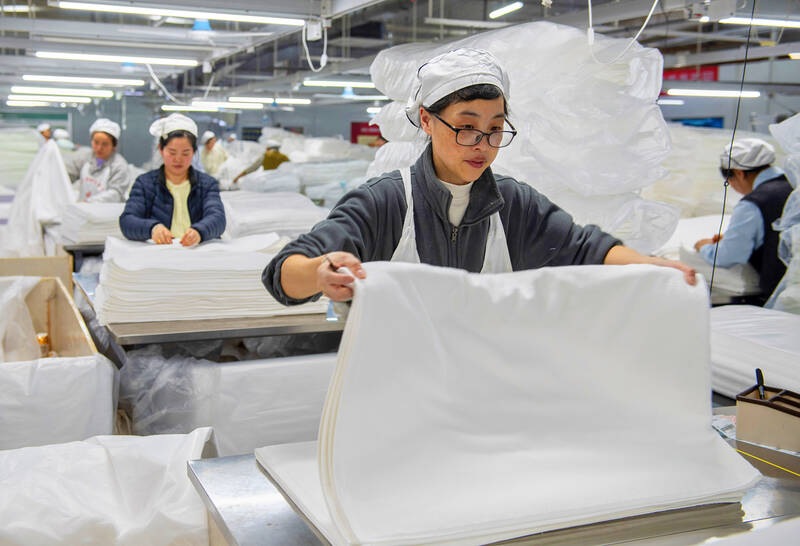China yesterday announced additional tariffs of 34 percent on US goods, the most serious escalation in a trade war with US President Donald Trump that has fed fears of a recession and triggered a global stock market rout.
Beijing also announced it was adding several US entities to an export control list and classifying others as “unreliable” entities.
Nations from Canada to China have readied retaliation in an escalating trade war after Trump raised US tariff barriers to their highest level in more than a century this week, leading to a plunge on global financial markets.

Photo: Chinatopix via AP
In Tokyo, one of top trading partners of the US, Japanese Prime Minister Shigeru Ishiba said that the tariffs had created a “national crisis” as a plunge in banking shares set the stock market on course for its worst week in years.
Investment bank JP Morgan said it now sees a 60 percent chance of the global economy entering recession by the end of this year, up from 40 percent previously.
With European shares also heading for the biggest weekly loss in three years, EU Commissioner for Trade and Economic Security Maros Sefcovic was yesterday speak to his counterparts in the US.
“The EU will respond in a calm, carefully phased, and above all, unified way, as we calibrate our response,” he wrote on social media. “We will not shoot from the hip — we want to give negotiations every chance to succeed to find a fair deal, to the benefit of both sides.”
The EU is divided on how best to respond to Trump’s tariffs, including on the use of its “Anti-Coercion Instrument,” which allows the bloc to retaliate against nations that put economic pressure on EU members to change their policies.
Nations that are cautious about retaliating and thereby raising the stakes in the standoff with the US include Ireland, Italy, Poland and Scandinavian nations.
The European Commission is nevertheless trying to finalize a list of 26 billion euros (US$29 billion) of US imports on which to place retaliatory tariffs in response to US tariffs on steel and aluminum.
French President Emmanuel Macron led the charge on Thursday by calling on companies to freeze investment in the US.
“Investments to come or investments announced in recent weeks should be suspended until things are clarified with the United States,” Macron said at a meeting with French industry representatives.
However, French Minister of Economics and Finance Eric Lombard later cautioned against like-for-like countermeasures on the US tariffs, warning that this would also rebound on European consumers.
“We are working on a package of responses that can go well beyond tariffs, in order, once again, to bring the US to the negotiating table and reach a fair agreement,” Lombard said in an interview with broadcaster BFM TV.

Intel Corp chief executive officer Lip-Bu Tan (陳立武) is expected to meet with Taiwanese suppliers next month in conjunction with the opening of the Computex Taipei trade show, supply chain sources said on Monday. The visit, the first for Tan to Taiwan since assuming his new post last month, would be aimed at enhancing Intel’s ties with suppliers in Taiwan as he attempts to help turn around the struggling US chipmaker, the sources said. Tan is to hold a banquet to celebrate Intel’s 40-year presence in Taiwan before Computex opens on May 20 and invite dozens of Taiwanese suppliers to exchange views

Quanta Computer Inc (廣達) chairman Barry Lam (林百里) is expected to share his views about the artificial intelligence (AI) industry’s prospects during his speech at the company’s 37th anniversary ceremony, as AI servers have become a new growth engine for the equipment manufacturing service provider. Lam’s speech is much anticipated, as Quanta has risen as one of the world’s major AI server suppliers. The company reported a 30 percent year-on-year growth in consolidated revenue to NT$1.41 trillion (US$43.35 billion) last year, thanks to fast-growing demand for servers, especially those with AI capabilities. The company told investors in November last year that

Application-specific integrated circuit designer Faraday Technology Corp (智原) yesterday said that although revenue this quarter would decline 30 percent from last quarter, it retained its full-year forecast of revenue growth of 100 percent. The company attributed the quarterly drop to a slowdown in customers’ production of chips using Faraday’s advanced packaging technology. The company is still confident about its revenue growth this year, given its strong “design-win” — or the projects it won to help customers design their chips, Faraday president Steve Wang (王國雍) told an online earnings conference. “The design-win this year is better than we expected. We believe we will win

United Microelectronics Corp (UMC, 聯電) forecast that its wafer shipments this quarter would grow up to 7 percent sequentially and the factory utilization rate would rise to 75 percent, indicating that customers did not alter their ordering behavior due to the US President Donald Trump’s capricious US tariff policies. However, the uncertainty about US tariffs has weighed on the chipmaker’s business visibility for the second half of this year, UMC chief financial officer Liu Chi-tung (劉啟東) said at an online earnings conference yesterday. “Although the escalating trade tensions and global tariff policies have increased uncertainty in the semiconductor industry, we have not